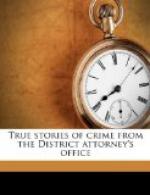Yet the positive identification of August Gemunder and the fatal disclosures of Eller, coupled with the vehement insistence of the prosecution, led the jury to resolve what doubt they had in the case against the prisoner, and, after deliberating eight or ten hours and being out all night, they returned a verdict of guilty. Flechter broke down and declared bitterly that he was the victim of a conspiracy upon the part of his enemies, assisted by a too credulous prosecuting attorney. Everybody admitted that it was an extraordinary case, but the press was consistent in its clamor against Flechter, and opinion generally was that he had been rightly convicted. On May 22nd he was sentenced to the penitentiary for twelve months, but, after being incarcerated in the Tombs for three weeks, he secured a certificate of reasonable doubt and a stay until his conviction could be reviewed on appeal. Then he gave bail and was released. But he had been in jail! Flechter will never forget that! And, for the time being at least, his reputation was gone, his family disgraced, and his business ruined.
A calm reading of the record of the trial suggests that the case abounded in doubts more or less reasonable, and that the Court might well have taken it from the jury on that account. But a printed page of questions and answers carries with it no more than a suggestion of the value of testimony the real significance of which lies in the manner in which it is given, the tone of the voice and the flash of the eye.
Once again Flechter sat at his desk in the window behind the great gilded fiddle. To him, as to its owner, the great Stradivarius had brought only sorrow. But for him the world had no pity. Surely the strains of this wonderful instrument must have had a “dying fall” even when played by the loving hand of old Jean Bott.
At last, after several years, in 1899, the case came up in the Appellate Division of the Supreme Court. Flechter had been led to believe that his conviction would undoubtedly be reversed and a new trial ordered, which would be tantamount to an acquittal, for it was hardly likely in such an event that a second trial would be considered advisable upon the same evidence. But to his great disappointment his conviction was sustained by a divided court, in which only two of the five justices voted for a new trial. Again Fortune had averted her face. If only one more judge had thought the evidence insufficient! The great gilded fiddle seemed to Flechter an omen of misfortune. Once more he gave bail, this time in five thousand dollars, and was set at liberty pending his appeal to the highest court in the State. Once more he took his seat in his office and tried to carry on his business.
But time had dragged on. People had forgotten all about Flechter and the lost Stradivarius, and when his conviction was affirmed little notice was taken of the fact. It was generally assumed that having been sentenced he was in jail.




